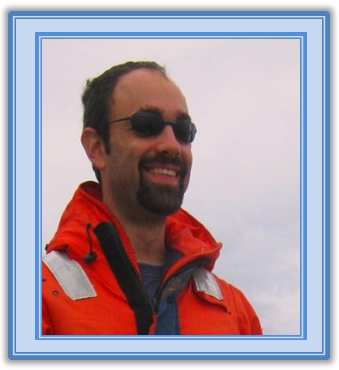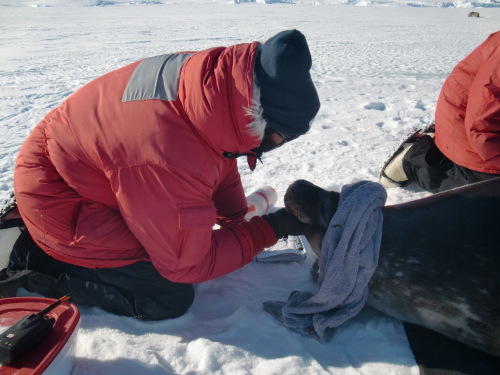Meet Greg, team veterinarian.
About Greg
 Meet Greg Frankfurter
Meet Greg Frankfurter
Where are you from?
I am from the ‘windy city’ – Chicago, IL.
Where do you live now?
I currently live in sunny Sausalito, CA.
Where did you go to college?
I received a B.S. in Biology from Humboldt State University, attended San Jose State University (Moss Landing Marine Labs) for graduate school and attended U.C. Davis Veterinary School, where I received my veterinary license.
Briefly, tell us about your job.
Being a wildlife veterinarian can be a widely varying career. I often find myself working in a wildlife rehabilitation clinic, writing grants and reading papers, and out in the field supporting wildlife research or rehabilitation – all in one week. It can be very exciting or incredibly tedious, depending what the task at hand might be.
About the Weddell seal project
What is your main role on this project?
As the field veterinarian, my main role is to maintain a safe working environment for the seals and the researchers. This involves anesthetizing and monitoring the animals, and doing whatever’s needed to support the well-being of the seals, as well as facilitating the research being conducted.
What are you looking forward to most about the project?
Never having been to Antarctica, I’m just excited to see all of the wildlife and get to work with the seals.
Please share your favorite picture of a Weddell seal.
 One of Greg's favorite picture with a Weddell seal. Photo credit: Alex Eilers.
One of Greg's favorite picture with a Weddell seal. Photo credit: Alex Eilers.
More about Greg
What’s the coolest part of your job?
Certainly, the marine mammals are the coolest part of my job. I love getting the chance to be hands-on with these incredible animals.
What is the most exciting, most amazing or scariest thing that has happened to you during your work?
I’m lucky to have a job with a lot of exciting, amazing and, we’ll just say, thrilling moments. I think one of the most incredible moments so far was working at The Marine Mammal Center and having the chance to work with so many animals at the center and in the field. Even after years of doing it, I still have moments nearly every day where I look up and realize what I’m getting to do with these amazing animals; they always keep it exciting!
 Greg in the field helping 'Punkin Pie.' Photo provided by Greg Frankfurter.
Greg in the field helping 'Punkin Pie.' Photo provided by Greg Frankfurter.
 Greg in the lab intubating 'Cappy.' Photo provided by Greg Frankfurter.
Greg in the lab intubating 'Cappy.' Photo provided by Greg Frankfurter.
What are some of the perks of your job?
I never forget that I’m working with animals that many people don’t even get to see at a distance. I also get to travel a lot, working with great groups of people and usually in beautiful environments.
If asked to ‘sell’ this career to someone, what would you say to convince them to pursue it?
It’s really about caring for animals, and the people that work with them. It can be exciting, fun, dirty, messy, tedious, stressful work, but I’ve never had a day where I wished I was doing anything else.
What advice would you give a student interested in pursuing your career?
Learn how to problem solve and learn how to memorize things! These are two of the most important skills for a vet – and necessary to survive vet school. As with everything else, be someone that people want to work with. Science is a team sport.
Fun Questions
Who inspired you on this path?
The first credit goes to three oiled murres on a rock. Beyond that, the veterinarians with the Oiled Wildlife Care Network and Mike Murray at Monterey Bay Aquarium – without those folks, I wouldn’t have gotten where I am today.
What did you want to be when you were 10 years old?
- A pilot
What are your favorite hobbies or activities?
- Rock climbing
- Sailing
- Hiking
 Greg sailing at Angel I Harbor. Photo provided by Greg Frankfurter.
Greg sailing at Angel I Harbor. Photo provided by Greg Frankfurter.
What are some interesting places you’ve traveled?
- Belize
- Australia
- Just out onto the Pacific Ocean – what an incredible environment!
 Just hanging out with my fish friends. Greg on a dive in BelizePhoto provided by Greg Frankfurter.
Just hanging out with my fish friends. Greg on a dive in BelizePhoto provided by Greg Frankfurter.
What 3 items would you take to a desert island, other than food and water?
- A compass
- A chart
- A boat
Tell me 5 ways to use a pencil, other than to write.
You can:
- Make a splint or a sextant
- Use it as a shim for furniture
- Shoe sole cleaner
- You can use 2 as chopsticks
 What??? He really is eating rice with pencils! Photo credit: Alex Eilers.
What??? He really is eating rice with pencils! Photo credit: Alex Eilers.

Comments